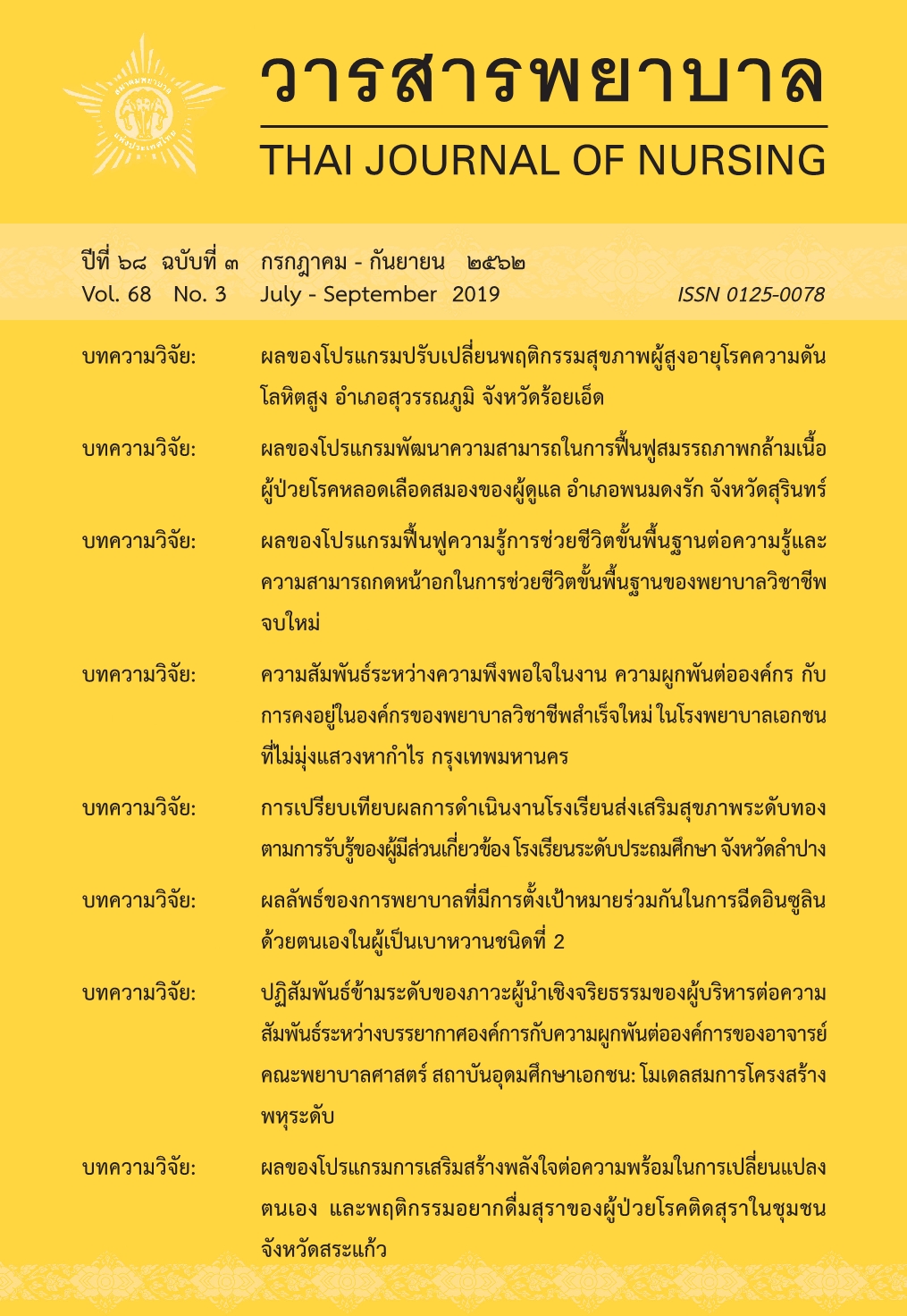Effects of the mind empowerment program on self- change readiness and alcohol craving in patients with alcohol dependence in community, Sa-kaeo Province
Main Article Content
Abstract
This quasi-experimental research aimed to compare self-change readiness and alcohol craving in patients with alcohol dependence in community, Sa-kaeo Province. A samples of 30 patients with alcohol dependence was purposively selected. They were equally divided into the experimental 1 and 2 groups by the matching method. Patients in the experiment 1 group participated in mind empowerment program, while patients in the experiment 2 group received brief advice counseling. Research tools were questionnaire on personal data, and self-change readiness and alcohol craving scale. Data were analyzedusing descriptive statistics and t-test. The results were as follows. In post experimental period, patients in the experimental 1 group had more self-change readiness and less alcohol craving than pre experimentaperiod and the patients in experimental 2 group at p < .001.
Article Details
References
กระทรวงสาธารณสุข กรมสุขภาพจิต. (2551). คู่มือแนวเวชปฏิบัติการให้บริการผู้มีปัญหาการดื่มสุราใน
โรงพยาบาลจิตเวช. นนทบุรี: ชุมนุมสหกรณ์การเกษตรแห่งประเทศไทย.
กุสุมา แสงเดือนฉาย. (2553). ผลของโปรแกรมการบำบัดทางความคิดและพฤติกรรมร่วมกับการสนับสนุน
ทางสังคมที่มีต่อความพร้อมที่จะป้องกันการติดซ้ำและพฤติกรรมการไม่ติดซ้ำของผู้ป่วยสุรา. (ดุษฎี
นิพนธ์ปริญญาดุษฎีบัณฑิต ไม่ได้ตีพิมพ์). มหาวิทยาลัยศรีนครินทร์วิโรฒ, กรุงเทพมหานคร.
ญาดา บุตรปัญญา, เพ็ญพักตร์ อุทิศ, และสุนิศา สุขตระกูล. (2559). ผลของโปรแกรมการเสริมสร้าง
แรงจูงใจอย่างต่อเนื่องทางโทรศัพท์ต่อพฤติกรรมการดื่มสุราของผู้ติดสุรา. วารสารพยาบาลทหารบก,
(3), 123-131.
ฏัฐณิชา เลอฟิลิบรต์. (2557). ผลกระทบจากการบริโภคเครื่องดื่มแอลกอฮอล์. ใน นพพล วิทย์วรพงศ์.(บ.ก.).
ทศวรรษศูนย์วิจัยปัญหาสุราสถานะความรู้เพื่อการควบคุมการบริโภคเครื่องดื่มแอลกอฮอล์.
(น. 95-137). กรุงเทพมหานคร: เดือนตุลา.
พรทิพย์ คงสัตย์, ศิริภรณ์ ชัยศรี, และสวัสดิ์ เที่ยงธรรม. (2556). การพัฒนาโปรแกรมเสริมสร้างพลังอำนาจ
ต่อการจัดการพฤติกรรมการดื่มสุราของผู้ป่วยโรคติดสุราระยะหลังพ้นภาวะถอนพิษสุรา. วารสาร
การพยาบาลจิตเวชและสุขภาพจิต, 27(1), 45-64.
พิชัย แสงชาญชัย. (2546). คู่มือการบำบัดเพื่อเสริมสร้างแรงจูงใจของผู้ป่วยติดสุรายาเสพติด การอบรมเชิง
ปฏิบัติการหลักสูตรจิตวิทยายาเสพติดสำหรับแพทย์เวชปฏิบัติทั่วไป. กรุงเทพมหานคร: กองจิตเวช
และประสาท โรงพยาบาลพระมงกุฎเกล้า.
พันธุ์นภา กิตติรัตนไพบูลย์, และปริทรรศ ศิลปะกิจ. (2552). การบำบัดแบบสั้นสำหรับผู้ดื่มแบบเสี่ยงและ
ผู้ดื่มแบบอันตราย คู่มือสำหรับสถานพยาบาลปฐมภูมิ. กรุงเทพมหานคร: ทานตะวันเปเปอร์.
พัชชราวลัย กนกจรรยา, และเพ็ญพักตร์ อุทิศ. (2556). ผลของโปรแกรมการบำบัดผสมผสานแบบสั้นโดย
ใช้การเสริมสร้างแรงจูงใจร่วมกับการปรับเปลี่ยนความคิดและพฤติกรรมต่อภาวะซึมเศร้าและ
พฤติกรรมการเสพสุราในผู้เสพติดสุรา. วารสารการพยาบาลจิตเวชและสุขภาพจิต, 27(2), 56-68.
สุวรรณา อรุณพงศ์ไพศาล. (2552). การป้องกันและรักษาภาวะถอนพิษสุรา. เชียงใหม่: วนิดาการพิมพ์.
Gibson, C. H. (1993). A study of empower in mothers of chronically ill in children (Unpublished
doctoral Dissertation). Boston College, Boston.
Krejcie, R. V., & Morgan, D. W. (1970). Determination sample size for research activities. Education
and Psychology Measurement, 30(3), 607-610.
Stoltz, P. G. (1997). Adversity quotient: Turning obstacles into opportunities. New York: John Wiley &
Son.


